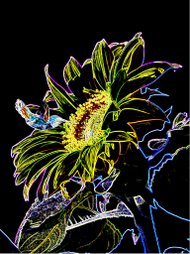The Hydroponic Gardening Practice that can Vastly Improve Soil Based Gardens
Many times Hydroponic gardeners have results that seem extra ordinary; but, with proper attention to detail, these same results can be had by soil based gardners as well. Successful hydroponics depends first and formost on monitoring the pH of the nutrient solution, yet soil based gardners often neglect this critical factor with their chosen growing medium.
To more specifically define an acidic or basic substance, scientists devised a numerical scale, called a pH scale, to categorize substances as an acid or base. Numerically, the scale is from 0 to 14, with 7 being the midpoint. Any solution or substance having a pH value of less than 7 is known as an acid and above 7 is considered a base. Seven is considered neutral. A special test paper can be used to numerically measure pH. Depending on the acidic or basic nature of the test solution, the paper turns a specific color which can be matched to a standard color chart correlated with pH values. A pH meter can also be used to measure the pH of a solution or substance like soil. The meter consists of a probe, which is placed in the solution and the meter displays a digital readout of the pH.
0 ——————7——————14
ACID———NEUTRAL———BASE
The pH value of soil and water is a critical variable for all gardeners to consider. Particular crops and plants require a specific pH to thrive and produce high yields. Whether it is growing tomatoes in a small garden or corn over many hundreds of acres, knowing and maintaining the correct soil pH is a must. A pH of 6.5 is found to be the most favorable for the availability of all plant nutrients and is the pH to which most soils and soil based composts are adjusted. Nitrifying bacteria work best above pH 6. Therefore nitrogen is more available. Vegetables vary to some extent in their requirements, but most garden crops will do well with a soil pH of 6.2 to 6.8. This is a little below neutral, or slightly acidic. If soil pH is too high or low, poor crop growth will result, largely due to the effects pH has on the availability of nutrients to plants.
It may not be possible to water with pH adjusted water, but it is still helpful to test the water source to know which way it is moving the ph of the soil. For container plants that are watered by hand it is possible to easily correct the pH of the water using the same pH-up or pH-down products used in hydroponics or aquaculture. These can be purchased at fish stores or hydroponics suppliers.
Water pH test kits can be purchased for less than $5 and soil test kits that use paper strips can be purchased for around $5. pH meters that are inserted into moist soil to test pH can be purchased for $12 and up. The good news is that most of these kits come with charts showing the optimum pH for various garden plants and if they don’t come with the kit, such charts can be found online.
Amendments to change pH levels
Lime and sulfur are common amendments to change soil pH. Dolomite limestone (calcium carbonate and magnesium carbonate) add calcium and magnesium and increases the pH. Agricultural (elemental) sulfur is used to acidify alkaline soil. The amount to add depends on the current and the desired pHs. Fortunately, most horticultural lime and sulfur products provide application charts showing how much is needed to move the PH from the tested level to the desired level for a particular size garden or planting container.
By monitoring and modifying soil pH, as needed, the soil based gardener will take a huge step towards matching the strengths of the controlled hydroponics environment. Plants grown in soil or media with the proper pH can readily use the nutrients available to them resulting in spectacular gardens.
Dr. Christopher J. Kline is a master gardener and writer living in Paradise Valley Arizona. He is an editor for The Ultimate Sunflower Site http://www.SunflowerOcity.com, a columnist for Garden and Greenhouse Magazine http://www.gardenandgreenhouse.net/ and an owner of Greenhouse and Garden Supply http://greenhouseandgardensupply.com/.
You can reach Chris at CKline72@Cox.net
Subscribe to:
Post Comments (Atom)


No comments:
Post a Comment